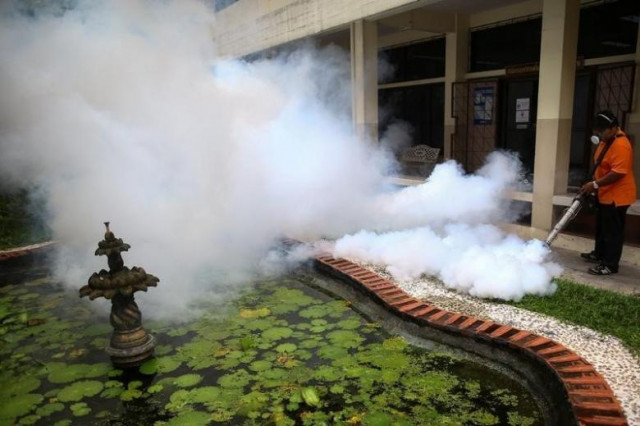Climate change amplifying malaria risk
Experts suggest a separate health policy should be devised in each district to eradicate disease

Fumigation to control the spread of mosquitoes. PHOTO: REUTERS
In a bid to eradicate the menace, malaria control interventions should target vulnerable and poor communities while healthcare officials should be equipped with resources to facilitate the masses.
This was stated in a study conducted by a team of experts of the University of Agriculture, Faisalabad comprising Sobia Rose and Prof Dr Muhammad Ashfaq. The title of the study was ‘Implications of Climate Change on Human Health: an Agricultural Perspective.’
‘Bed nets’ sold in open market as Malaria cases on the rise: WHO
While speaking to The Express Tribune, Sobia Rose said, “Anthropogenic climate change and its effects on different aspects of life is one of the most heated debates and serious challenge for food security and human life.”
She added, “Besides other sectors like water quality, food security, increasing frequency of floods and other natural disasters, rapidly increasing heat stress due to climate change has a profound effect on human health and causes many diseases.”
She maintained in Pakistan, malaria was considered as the second most prevalent and infectious disease. “To verify the relationship between climatic variations and malaria outbreak, we have initially conducted a study in 15 districts of Punjab to ascertain its effects and consequences,” she pointed out.
Rose said, “Although variations in climatic factors provide favourable conditions for mosquito habitats and their reproduction in study area but improvement in living conditions cause less malarial morbidity level.”
She said for the purpose, a study was conducted in one of the low-lying areas in Muzaffargarh which was found highly malaria endemic with very poor health and education facilities.
The study revealed despite initiating malaria eradication programmes the disease is still prevalent in the area and on an average it has infected two per thousand population.
Three countries to pilot world's first malaria vaccine
Sobia Rose said therefore, an in-depth analysis was carried out by interviewing 250 farmers in Muzaffargarh. “The results indicated that farmers were most affected by malaria as they work in environmental conditions which are the favorite habitats of mosquito production,” she added.
She said these deteriorating health conditions significantly reduce revenue earned from agricultural production.
She told The Express Tribune, “This leads to a remarkable increase in health cost for farm workers. A detailed comparison revealed that farmers, who did not face malaria in the previous cropping season, were more educated and maintaining cleaner living conditions as compared to those who suffered the disease.”
Sobia said, “To address malaria as a disease of poverty and structural inequality, a sustained multi-sector and multilateral commitment is required on urgent basis with a comprehensive approach. A foundation for change can only be laid if resources are invested in healthcare and environment.”
“In our country, the resource allocation patterns and inequitable healthcare system undermine the ability to have a complete control on spread of disease. So keeping in view all these facts, a climate based malaria decision support system should be launched at national level.”
The study revealed that investment in health sector improves the overall efficiency of human capital that can lead a country from the situation of economic growth to economic development.
It stated there should be a separate health policy in each district for the eradication of malaria according to the climatic conditions and the current socio–economic facilities. The budget allocation should be different and more malaria-prone districts should be targeted first to eradicate the disease completely, the study further stated.
Published in The Express Tribune, May 15th, 2017.



















COMMENTS
Comments are moderated and generally will be posted if they are on-topic and not abusive.
For more information, please see our Comments FAQ